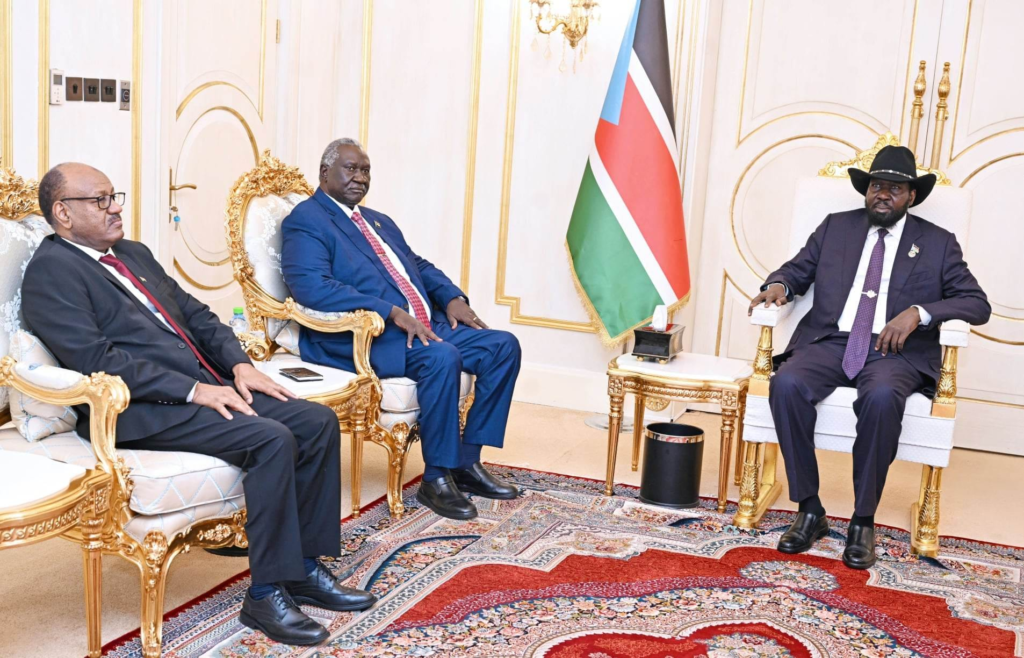The head of the Sudanese Sovereignty Council is wary of any possible temptations by neighbouring countries, especially Ethiopia, to support the commander of the Rapid Support Forces.

KHARTOUM
The newly-appointed Vice-President of the Transitional Sovereignty Council in Sudan, Malik Agar, is acting as a presidential envoy to neighbouring countries whose role could be critical for Army chief General Abdel Fattah al-Burhan in the future as conflict with the Rapid Support Forces drags on.
Burhan last month sacked paramilitary RSF leader General Mohamed Hamdan Dagalo from his position as deputy president of the Sudan’s sovereign council and appointed former rebel leader Malik Agar in his place.
Agar, who has no previous diplomatic nor foreign negotiating experience, visited Ethiopia where he met Prime Minister Abiy Ahmed to try to learn more about the position of Addis Ababa, which is known to have maintained good relations with Dagalo, Sudanese media reported Wednesday.
The role of Addis Ababa, which hosts the African Union’s headquarters, could be crucial in Sudan mediation efforts.
Two months before the outbreak of the war, Burhan showed signs of concern over Addis Ababa’s ties to Dagalo. He sought closer relations with Ethiopia by stressing “full agreement” on the issue of the Grand Ethiopian Renaissance Dam, after having previously backed Cairo in the dam conflict.
Agar made other visits to South Sudan, Uganda and Kenya.
Sources say that Agar wants through his visits to reactivate the role of IGAD-mandated leaders of South Sudan, Djibouti and Kenya as mediators to the Sudan conflict.
Agar has nonetheless criticised the East African bloc’s efforts to find a comprehensive solution to Sudan’s problems.
“I don’t want to talk about the problem of Sudan because the problem is war, and it should be stopped with mechanisms and programmes. This is what is needed now, and there is an attempt to skip steps,” he said.
Moussa Faki Mahamat, the chairman of the African Union Commission, has however defended the initiative, saying that “inclusive dialogue is vital for transitioning Sudan back to civilian rule, rebuilding public services, addressing the urgent needs of the population and preparing the country for democratic, free and fair elections.”
On RSF tracks
The Agar visits to the Intergovernmental Authority on Development (IGAD) member states come on the heels of a prior tour to the region by Youssef Ezzat, the political advisor to the RSF commander and seem aimed at countering the outreach efforts of Dagalo, who had worked on forging strong ties with neighbouring countries since the fall of Omar Hassan al-Bashir’s regime.
Sudanese experts said that Malik Agar’s tour will not change much in the regional equation and has the limited ambition of avoiding the depletion of sympathy for Burhan, which could cause the latter to be treated as an outcast in the region. The head of the Sudanese Sovereignty Council is wary of the risk of Sudan’s neighbours, especially Ethiopia, supporting the commander of the Rapid Support Forces.
In Juba, Agar met South Sudan President Salva Kiir Mayardit, who also heads the IGAD mediation team.
Agar briefed Kiir on the security situation in Sudan and the results of his visit to Kenya and Uganda. He also called for the harmonising the initiatives of Jeddah, the African Union and the IGAD to stop the war.
“President Salva Kiir Mayardit reiterated his commitment towards the restoration of peace and stability in Sudan,” said a statement in Juba.
He reaffirmed support for President Kiir’s mediation noting that Juba remains an ideal place for peace talks.
“It is our duty to stop the war in Sudan and reach logical solutions through dialogue,” Agar was quoted as saying.
‘Senseless war’
Speaking to the media after the meeting, Agar called the raging conflict in Sudan “a senseless” war.
His remarks raised questions about his full adherence to Burhan’s military strategy and his willingness to defend the ongoing fighting.
Salah al-Din al-Douma, a professor of political science at the University of Khartoum, said that Agar’s regional tour does “not carry specific and clear ideas for stopping the war and settling the conflict, and the Agar tour only reflects the type of manipulation by the Muslim Brotherhood, which wants to forestall an end to the war.”
In Jeddah, a mediation source said Sudan negotiations were continuing in an effort to ensure safe passage for humanitarian assistance.
Saudi Arabia and the United States brokered the ceasefire that ended on Saturday.
Consultations for a new truce deal, which had been reported by Saudi TV station Al Arabiya on Tuesday, were at an early stage and complicated by continued fighting.
Battles across the three cities that make up Sudan’s greater capital region, Khartoum, Bahri and Omdurman, have picked up since a 12-day ceasefire between the army and RSF formally expired on June 3 after repeated violations.
A massive fire broke out on Wednesday near a military complex containing an arms factory in southern Khartoum which Sudan’s army has struggled to defend in some of the fiercest fighting for weeks in its conflict with the RSF, witnesses said.
More than 1.4 million people have been displaced within Sudan and a further 476,800 have fled into neighbouring countries, most of which are already grappling with poverty and internal conflict, according to estimates from the International Organisation for Migration (IOM).
Sudan’s health ministry has recorded at least 780 civilian deaths in Khartoum as a direct result of the fighting. Hundreds more have been killed in the city of El Geneina in West Darfur. Medical officials say many bodies remain uncollected or unrecorded.






